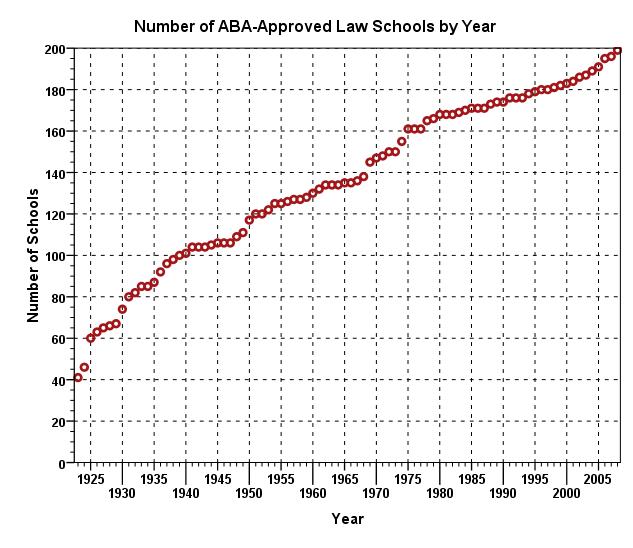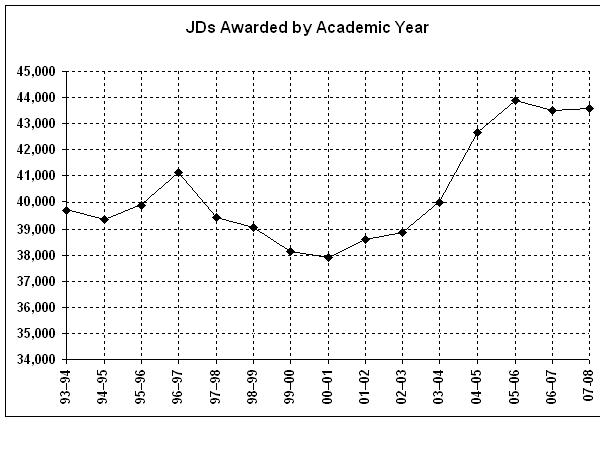According to The National Jurist (September 2009), there are 10 new schools on the way (pp. 12-13). That doesn’t even count
- the new campus the University of Idaho plans to open in Boise (mentioned in the article), or
- the new public law school (approved earlier this year) the University of North Texas will open in Dallas in Fall 2010.
According to the ABA, there are now 199 provisionally or fully ABA-approved law schools offering JDs. The following chart shows the growth in ABA-approved law schools since 1923, when the ABA began approving law schools.

Twenty years ago (1989), there were 174 ABA schools. That’s 25 more law schools, or a growth of just over 14%. Assuming that all 12 of the law-schools-in-formation make it to at least provisional ABA approval, the United States will have 211 law schools.
How much of this is demand driven? According to the ABA, the number of JDs granted each year peaked in the 1996-1997 academic year, at 41,115, and then dropped for several years to a low of 37,910 (2000-2001). The number of JDs did not recover to at least the 1996-1997 level until 2004-2005 (42, 672 JDs). During that period the number of law schools increased from 180 (1997) to 184 (2001) to 191 (2005). That growth was not driven by demand .
 One of the new law schools mentioned in the article is Louisiana College, who cites unmet demand in Louisiana. Here’s the most recent information from the Official Guide to ABA-Approved Law Schools (2010 edition) on the 4 Louisian law schools, as well as Mississippi College (mentioned as the fall-back for would-be lawyers from Louisiana):
One of the new law schools mentioned in the article is Louisiana College, who cites unmet demand in Louisiana. Here’s the most recent information from the Official Guide to ABA-Approved Law Schools (2010 edition) on the 4 Louisian law schools, as well as Mississippi College (mentioned as the fall-back for would-be lawyers from Louisiana):
- LSU: 499 offers on 1299 applications (38%); medians of 156 (LSAT) & 3.51 (GPA)
- Loyola-NO: 799/1,611 (50%); 152 (LSAT) & 3.33 (GPA)
- Southern: 376/1,114 (34%); 145 (LSAT) & 2.83 (GPA)
- Tulane: 931/2,612 (36%); 162 (LSAT) * 3.59 (GPA)
- Mississippi College: 621/1166 (53%); 150 (LSAT) & 3.22 (GPA)
The Bar-passage data for Mississippi College shows that 13 persons took the Louisiana Bar exam, out of 157 total persons taking a Bar exam for the first time. More Mississippi College graduates from Louisiana might have taken the Bar exam first in Mississippi, but still intend to return to Louisiana.
In the article, Bill Henderson (Indiana, Bloomington) wonders whether there will be enough high-paying jobs to let an ever-increasing number of graduates pay off their college–and law school!–loans.
Gary Rosin

Part 5 the Legal Education at the Crossroads conference
Thursday, September 24th, 2009The Big News from the Conference on Assessment: Steve Bahls, Chair of the Student Learning Outcomes Subcommittee of the American Bar Association Section of Legal Education and Admission to the Bar’s Standards Review Committee, presented the draft of the new Standards on assessment. From his presentation, it sounds as if some form of these Standards will be recommended by the ABA.
Where do the new Standards take us? First, the ABA, fortunately in my view, is not taking an extreme position. The proposed Standards would require that all schools do some assessment of certain required competencies, such as “legal analysis and reasoning, legal research, problem solving, written and oral communication in a legal context.” Beyond that, each school is required to identify additional learning outcomes based upon its own mission. So, the ABA appears to be seeking to preserve a good degree of law school autonomy.
The real sea change comes, however, from the requirement that each school must “employ a variety of valid and reliable measures systematically and sequentially throughout the course of the students’ studies.” Thus, a school simply will not be able to use a single summative final examination in the future, at least not in all its courses. This is no doubt a good thing, but it will involve a huge change in how we teach.
Jeff Rensberger
Posted in ABA, Assessment, Commentary, Conferences, Law Professors, Law Schools, Rankings, Student Learning, Teaching | 3 Comments »